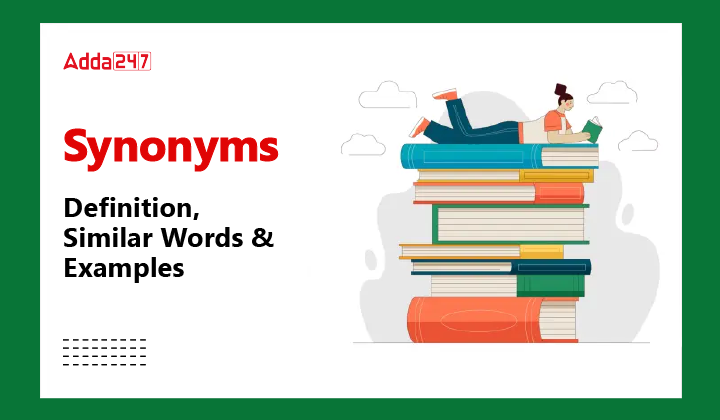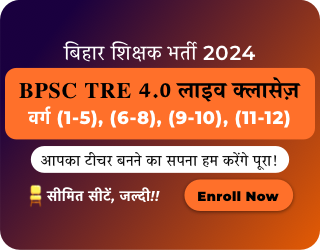
Candidates preparing for the Government Teaching Exam 2023 should enhance their understanding of all concepts of English Grammar. To help the candidates improve their conceptual comprehension of Synonyms which is one of the most important topics of any Government teaching exam, we have discussed the Synonyms in detail. Candidates will find all the essential information on the Synonyms in the following article.
Define Synonyms
Synonyms are words or phrases that have similar or nearly identical meanings. They are often used interchangeably in context without changing the overall sense of the sentence. When two or more words are considered synonyms, they can be substituted for each other in a sentence without altering their meaning significantly.
Synonyms play a crucial role in language, providing variety and flexibility in expression and communication. They help writers and speakers avoid repetition and add nuance to their language by offering different ways to convey the same idea. For example, “happy” and “joyful,” “big” and “large,” and “begin” and “commence” are examples of synonyms.
Why are Synonyms Used?
Overall, synonyms are valuable linguistic tools that enable effective communication, enhance language variety, and provide individuals with the flexibility to tailor their expressions according to the specific context and purpose. Synonyms are used for a variety of reasons, all of which contribute to more effective and engaging communication:
Avoiding Repetition
Synonyms allow writers and speakers to avoid using the same word repeatedly, which can make their language sound monotonous and uninteresting. By employing synonyms, they can keep the content fresh and engaging.
Precision and Clarity
Different synonyms often carry subtle differences in meaning or connotation. Choosing the right synonym can help convey a specific shade of meaning, making the message more precise and clear to the audience.
Enhancing Language Variety
Using synonyms adds richness and variety to language. Instead of relying on a limited set of words, speakers and writers can draw from a broader range of vocabulary, making their expressions more captivating.
Adjusting Language to Context
Synonyms allow individuals to adjust their language to the context or audience they are addressing. They can choose synonyms that are more familiar to the audience or better suited to the formality or informality of the situation.
Expressing Emotions and Tones
Different synonyms can convey varying emotions and tones. Writers and speakers can select synonyms that align with the desired mood, whether it’s formal, casual, joyful, somber, or any other emotional state.
Language Learning and Expansion of Vocabulary
Synonyms are valuable tools for language learners as they help expand vocabulary and improve understanding of word usage. By learning synonyms, learners can become more proficient in a language and express themselves more effectively.
Creative Writing and Descriptions
In creative writing, synonyms are often used to create vivid descriptions and enhance storytelling. They allow authors to paint a more detailed and colorful picture of characters, settings, and events.
Avoiding Word Monotony
In professional writing, such as academic papers or business communication, synonyms are crucial for avoiding word monotony. Overusing the same words can make the writing appear unprofessional and less credible.
Overcoming Word Limitations
In certain situations, such as writing headlines or crafting social media posts, there might be limitations on the number of characters or words allowed. In such cases, synonyms can help convey the intended message concisely.
Examples of Synonyms
These examples demonstrate how different words with similar or nearly identical meanings can be used interchangeably to convey the same idea while providing variety and nuance to language.
| Examples of Synonyms | |
| Words | Their Synonyms |
| Happy | Joyful, delighted, content, pleased, cheerful |
| Big | Large, huge, gigantic, massive, enormous |
| Begin | Start, commence, initiate, launch, kick-off |
| Angry | Mad, furious, irate, enraged, incensed |
| Beautiful | Gorgeous, stunning, lovely, attractive, pretty |
| Sad | Unhappy, sorrowful, melancholy, gloomy, downcast |
| Smart | Intelligent, clever, brilliant, sharp, wise |
| Funny | Amusing, comical, humorous, entertaining, witty |
| Fast | Quick, rapid, swift, speedy, accelerated |
| Small | Tiny, little, miniature, petite, compact |
| Cold | Chilly, frigid, freezing, icy, frosty |
| Tired | Fatigued, exhausted, weary, drained, spent |
| Brave | Courageous, fearless, bold, valiant, heroic |
| Quiet | Silent, hushed, calm, tranquil, peaceful |
| Hard | Difficult, challenging, tough, arduous, demanding |








